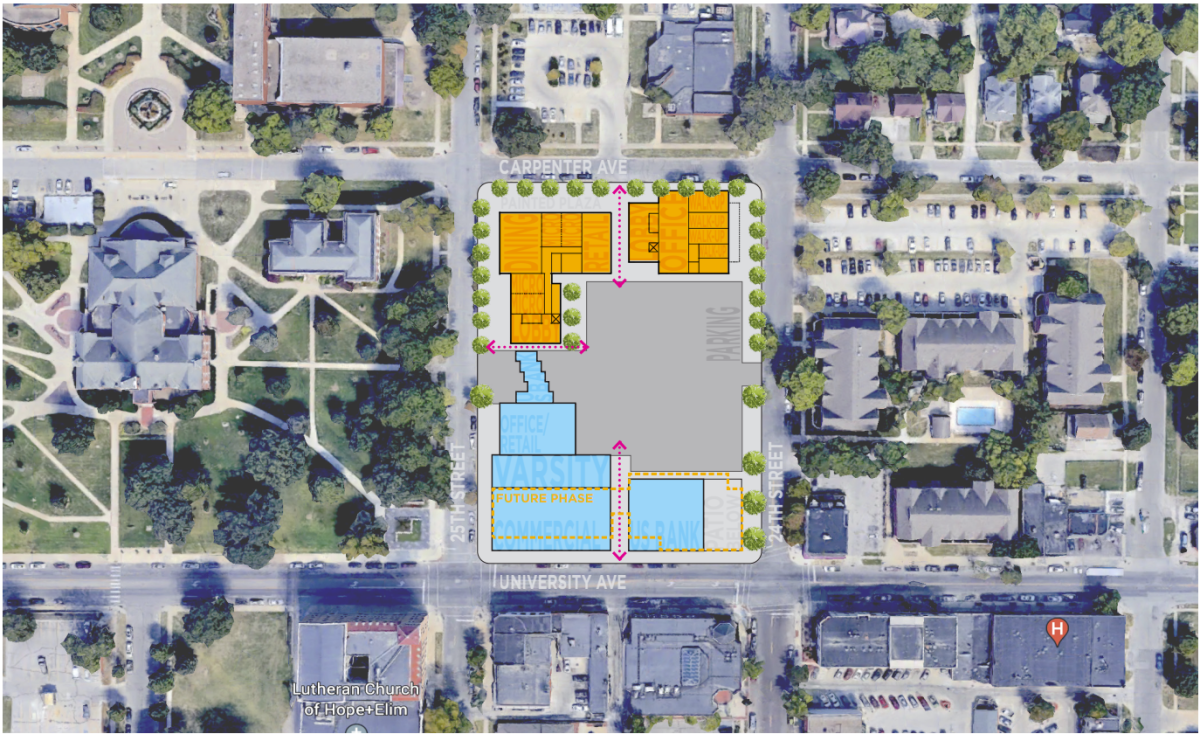Drake students and the surrounding community will see their beloved Dogtown district get a facelift within the coming year. Through two independent development projects, Merge Urban Development Group and Varsity Cinema hope to further establish Dogtown as a community-building space featuring a variety of unique local businesses.
Once completed, the two five-story mixed commercial and residential buildings on Carpenter St. between 24th and 25th Streets and the art house cinema will each provide value to the neighborhood, leaders of both projects said. The new buildings will include spaces conducive to start-up businesses as well as affordable housing, while the Varsity Cinema will show programming not typically available at commercial movie theaters.
“You would think a restaurant would see another restaurant as competition but that’s not how it’s viewed. It creates an economic node, a destination for people that don’t live in the area to come to,” community engagement director Ryan Arnold said. “People in Waukee or Ankeny, whenever they say, ‘Oh, let’s go to Des Moines tonight.’ It’s not just ‘Let’s go to the East Village.’ ‘Let’s go check out Dogtown.’ ‘Let’s go and grab some Gursha before we go to xBk’ — that’s what I hope is being created through these opportunities.”
The buildings’ lower levels will consist of micro-retail bays, which are spaces designed for start-up businesses or businesses that previously operated online. Merge CEO Brent Dahlstrom said micro-retail bays allow for a lower cost of entry because they provide bathrooms, which can cost a new business up to $50,000.
“We love those kinds of businesses,” Dahlstrom said. “They make a neighborhood feel special and different [rather] than just having another large corporation in there, and that’s really the types of businesses that we’re trying to continue to add to Dogtown, which already exist.”
Additionally, the buildings’ upper levels will consist of 116 residential units, 20 percent of which are considered by the city of Des Moines to meet affordability standards. Arnold said that ten percent of the units are considered affordable for those making 80 percent of Des Moines’ average median income, while 10 percent will be considered affordable for those making 65 percent of average median income, based on income data compiled by the United States Department of Housing and Urban Development.
Arnold said that students will not be eligible for the reduced rent due to state laws, which are “not meant to subsidize student housing.”
Even so, Arnold and Dahlstrom agreed that the economic diversity encouraged by affordable housing is an asset to both Drake University and the broader neighborhood. Arnold also noted that economic diversity is representative of Des Moines’ racial diversity due to racial wealth inequalities.
“It’s in the best interest of Drake as an institution that these projects are mixed-income because that retains diversity in the neighborhood, and that is an asset to this University,” Arnold said. “It’s a value that the community reflects a diversity of people.”
The planned site includes a building that was once occupied by Gazali’s Mediterranean Restaurant, an empty lot and a parking lot, the Des Moines Register reported, and a building that used to house Drake’s public safety and marketing and communications departments will be demolished.
Construction of the buildings is planned to commence in the fall, Dahlstrom said, although supply chain delays are expected. By then, Varsity Cinema hopes to have its doors open and be offering a wide range of non-mainstream programming.
“[If] people want to go see a movie, they’re going to go to a movie theater. They’re gonna stop at the coffee shop, the restaurant, the bar nearby, so we’re excited to be able to contribute to the Drake neighborhood by being that entertainment destination,” said Ben Godar, Director of the Des Moines Film Society.
Godar said that the art house cinema will specialize in American films, international films and classic films. He said that the cinema’s late-night programming could be of particular interest to students.
“Our mission is to grow the culture and to highlight film voices that might not be highlighted otherwise and bring films to Des Moines that would not play here otherwise,” Godar said.
The Varsity renovation includes adding an extra theater, expanding the lobby space to allow for conversation after movies, accessibility features and giving the building a facelift while preserving its historic integrity, Godar said. Renovation work began in 2017 and is planned to finish by the end of the year, although Godar said he is unsure about an exact date.
The project is supported by several donors within the community, some of whom are Drake alumni.
“We do have a number of people that have supported our project who are Drake alumni and who have fond memories of the varsity from their student days at Drake, which could have been in the 80s, the 70s, even the 60s,” Godar said. “One thing that we hear from them is their memories of a really vibrant Dogtown, [with a ] neighborhood theater, restaurants and just a lot of places where the community was.”
That “vibrant Dogtown” is about to gain a new brand and logo, according to Arnold, but the details and release date are uncertain. For now, Dogtown will continue to develop.
“There’s a number of exciting projects that are going on in the neighborhood, and so it’s exciting to be a part of this neighborhood that’s seeing so much development and really starting to thrive,” Godar said.








